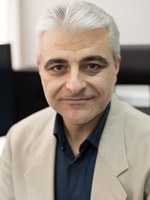Curriculum Vitae
Nektarios Tavernarakis is the Chairman of the Board of Directors at the Foundation for Research and Technology-Hellas (FORTH), Research Director at the Institute of Molecular Biology and Biotechnology (IMBB), and Professor of Molecular Systems Biology at the Medical School of the University of Crete, in Heraklion, Greece. He is the Director of the Graduate Program on BioInformatics at the Medical School of the University of Crete, and is also heading the Neurogenetics and Ageing laboratory of IMBB. He is an elected corresponding member of the Academy of Athens, and an elected member of the Scientific Council of the European Research Council (ERC), the European Institute of Innovation and Technology (EIT) Governing Board, the European Molecular Biology Organization (EMBO), the German National Academy of Sciences (Leopoldina), the European Academy of Sciences and Arts, and Academia Europaea. He has also served as the Director of the Institute of Molecular Biology and Biotechnology. He earned his Ph.D. degree at the University of Crete, and trained as a postdoctoral researcher at Rutgers University in New Jersey, USA. His research focuses on the molecular mechanisms of necrotic cell death and neurodegeneration, the interplay between cellular metabolism and ageing, the mechanisms of sensory transduction and integration by the nervous system, and the development of novel genetic tools for biomedical research. He has published numerous scientific papers in top-tier, cross-discipline, international scientific journals, in addition to invited book chapters, and other publications, including editorials, commentaries, and science-popularizing articles. His research has been commended internationally, and is supported by highly competitive funding from the European Union, international organizations and the Greek Government. For his scientific accomplishments, he has received several notable scientific prizes, including two ERC Advanced Investigator Grants, and an innovation-supporting ERC Proof of Concept Grant. He is one of the first in Europe, and the first in Greece, to have been awarded this highly competitive and prestigious grant twice. He is also the recipient of the EMBO Young Investigator award, the Alexander von Humboldt Foundation, Friedrich Wilhelm Bessel research award, the Bodossaki Foundation Scientific Prize for Medicine and Biology, the Empeirikeion Foundation Academic Excellence Prize, the Research Excellence award of the Foundation for Research and Technology-Hellas, the BioMedical Research Award of the Academy of Athens, the Galien Scientific Research Award, the Helmholtz International Fellow Award, the International Human Frontier in Science Program Organization (HFSPO) long-term Postdoctoral Fellowship, the Honorary Education Business Award, and the Dr. Frederick Valergakis Post-Graduate Research Grant Program Academic Achievement Award of the Hellenic University Club of New York.
- Palikaras K., Lionaki E. & Tavernarakis N. (2015) Coordination of mitophagy and mitochondrial biogenesis during ageing in Caenorhabditis elegans. Nature, 521: 525-528.
- Kourtis N., Nikoletopoulou V. & Tavernarakis N. (2012) Small heat shock proteins protect from heat stroke-associated neurodegeneration. Nature, 490: 213-218.
- Artal-Sanz M. & Tavernarakis N. (2009) Prohibitin couples diapause signaling to mitochondrial energy metabolism during ageing in Caenorhabditis elegans. Nature, 461: 793-797.
- Syntichaki P. Troulinaki K. & Tavernarakis N. (2007) eIF4E function in somatic cells modulates ageing in Caenorhabditis elegans. Nature, 445: 922-926.
- Syntichaki P., Xu K., Driscoll M. & Tavernarakis N. (2002) Specific aspartyl and calpain proteases are required for neurodegeneration in C. elegans. Nature, 419: 939-944.
The role of mitophagy in neuronal quality control and survival during ageing
Ageing is associated with marked decrease of neuronal function and increased susceptibility to neurodegeneration, in organisms as diverse as the lowly worm Caenorhabditis elegans and humans. Although, age-related deterioration of the nervous system is a universal phenomenon, its cellular and molecular underpinnings remain obscure. The aim of the proposed research is to address this fundamental problem. We will combine the power of C. elegans, a highly malleable genetic model which offers a precisely defined nervous system, with state-of-the-art microfluidics and optical imaging technologies, to manipulate and monitor neuronal activity during ageing, in vivo. Given the pronounced bioenergetic demands and exceptional endurance of neuronal cells throughout the lifespan of an organism, we will focus on mitochondrial maintenance and turnover. Our objectives are three-fold. First, establish a microfluidics platform for assessing the fate of neuronal mitochondria during ageing in isogenic populations of wild type animals, long-lived mutants and animals under caloric restriction, a condition known to extend lifespan from yeast to primates. Second, examine the contribution of mitochondria-specific autophagy (mitophagy) in long-term neuron survival. In this context, we will also assess how ageing modulates mitophagy to inflict neuronal damage in nematode models of human neurodegenerative disorders. Third, conduct genetic screens for modifiers of mitophagic activity in neurons. We will seek to identify and characterize genes and molecular pathways that control neuronal mitophagy during ageing. Together, these studies will advance our understanding of age-related breakdown of neuronal function and will provide critical insights with broad relevance to human health and quality of life.
